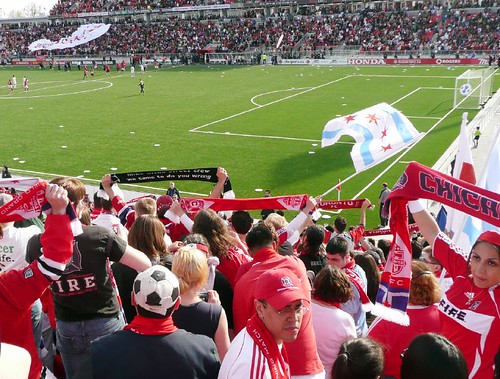
So, another display of incompetence from a San Siro-based squad, and another Premiership side goes through to the quarter-finals. For the first time in the history of the tournament, four sides from one country will make it to the quarter-finals.
And let's be honest here: unless two of the English sides get drawn against each other (teams from the same country are kept apart at the round of 16, but it's an open draw from this point on), there's a damn good chance that all four sides could make it through to the semis. face it, of the four remaining non-English sides, how many would you fancy? Schalke played disastrously against Porto and were lucky to survive through to penalties. Barca are in terrible form and will be without Messi for the next round. Fenerbahce play with verve but their keeper makes David James look like Lev Yashin. Roma...well, maybe Roma on a good day could beat Chelsea, but that's about it.
(You want my opinion? For what it's worth - Arsenal and Man U will go through to the semis provided they don't face each other. Liverpool will go through provided they don't play Arsenal or ManU, in which case they will get hammered; Chelsea are through provided they face Schalke, Fener or Barca. Schalke have no chance against any of the other seven teams).
Lucky Albion? A bit, but more importantly it demonstrates that the concentration of money and talent in England is beginning to put some distance between the Premiership and the rest of Europe in terms of skill and talent. There are perhaps only a couple of teams in Europe that can hope to match England's "Big Four" for quality, depth and speed.
This gap isn't likely to be bridged soon, either. Lack of money is a hindrance in Italy. Inter have almost nowhere to go but down. Milan are at the start of a long rebuilding phase. In Spain, Barcelona probably have a year or two of rebuilding to do what with Messi's future uncertain, Henry clearly in decline and Ronaldinho almost certainly out the door. Real Madrid might have a better shot at it, but Sergio Ramos apart, their defence is deeply ordinary and Diarra still isn't the replacement for Makelele that they need. Bayern look very promising, but this year's success might not be sustainable given the extent to which it is built on the superb goal-a-game performance of Luca Toni, who is no spring chicken either.
Although rule changes have left it somewhat lacking in majesty, the Champions League is arguably the best football competition in the world - better even, some might say, the World Cup (would the '06 Italy squad have beaten the '06 Barca squad? hard to say...). This makes the Premiership's dominance all the more remarkable. It is the dominant grouping within the globe's dominant competition. It is therefore no surprise that so many people in so many countries - especially in Asia and Africa - follow the Premiership more closely than they follow their domestic leagues.
It is in this context, I think, that the Game 39 proposals need to be seen. The Premiership, more than any other league, has exlpoited modern capital and communications to make itself "the world's league". It's playing squads are more cosmopolitan and it's fan base more global than any other. These two things are closely entwined - it is the Premiership's ability to raise TV revenue in countries far and wide that allows them to attract the best players (more crudely, it's my damn cable fees that permit Spurs to spend 16M on Darren Bent, for all the good that's done them).
And so it's reasonable to ask - to whom does the Premiership belong? The English? Or to all of us? As the league and its clubs get better at monetizing foreign interest in the game, the answer is increasingly "all of us". And it's only a short step from that to saying that all of us should occasionally get a chance to see our heroes in the flesh.
The game 39 idea tried to reconcile two ideas: not taking any games away from domestic fans, while atthe same time not feeding the extra-territorial fans the pablum of friendlies. The problem is that this can't actually be reconciled within the framework of a balanced schedule. And so for that reason if no other, these games abroad were never likely to work.
More instructive than the English fans' reaction - which was both predictable and selfish, given the extent to which their teams' good fortune depends on the pockets of others - was FIFA's. Blatter seemed to imply that competitve matches on foreign soil were contrary to article 2 of the FIFA statutes (really, Sepp? how 'bout the Mexicans playing their CONMEBOL qualifying tourneys in the US? Or the Italians playing the Supercoppa in Giants Stadium?) .
What Blatter's really worried about is a league and it's clubs transcending FIFA's rigidly Westphalian system, which allows FA suits to act like dictators within their own spheres (a curious echo of the pre-Westphalian doctrine of
cuius region eius religio). Once a league gets big enough to transcend this, then the moral basis for the current organziation of FIFA collapses.
Where sovereign interests are at stake, it makes sense that international organiations are organized along national lines. Where sovereign interests are not at stake - and in sport there's no real reason they should be, apart from the historical accident of Baron de Coubertin having started international sport at right about the time classic 19th century nationalism was at its height - then a FIFA-like organization is less obviously necessary. The Premiership's growing dominance is, in a very real sense, an existential challenge to FIFA - a constant reminder that the Westphalian organization of sports is not immutable.
For those of you wondering where this might lead, think about the relationship between the NHL and the International Ice Hockey Federation. Now, the Premiership isn't ever going to be as powerful as the NHL because the gap between it and other leagues is never likely to grow that wide. But it goes to show that there are other possible balances of power between popular multi-national leagues and international governing bodies.
As the (nearly) always-wise Arsene Wenger has said, Game 39 may be dead at the moment, but the idea of global expansion is very unlikely to go away because there are massive gains for clubs to reap by finding ways to go global. Traditionalists won't likely. But being the World's League means you have to go meet the world occasionally. This story has a very long way to run; and should we get a pair of all-England semis, the debate will merely intensify.
 I am upset with myself for not having worked on this blog enough. I have all sorts of half-written blog posts - on Buddhist football; Game 39; the new Canada Cup, the strange fact that George Gillett, tired of Liverpool, has decided that Montreal, of all godforsaken places, is the place to stake one's claim to football glory. All sorts of feelings of shame and guilt.
I am upset with myself for not having worked on this blog enough. I have all sorts of half-written blog posts - on Buddhist football; Game 39; the new Canada Cup, the strange fact that George Gillett, tired of Liverpool, has decided that Montreal, of all godforsaken places, is the place to stake one's claim to football glory. All sorts of feelings of shame and guilt.




